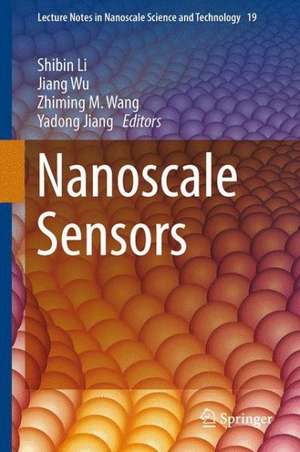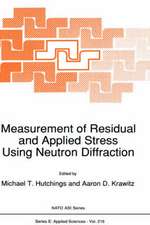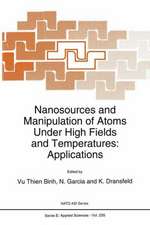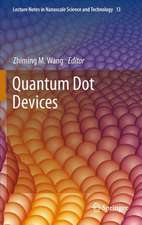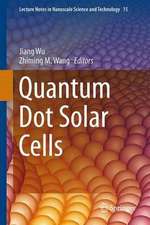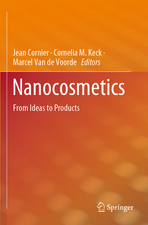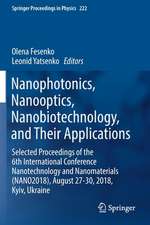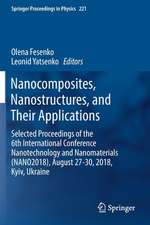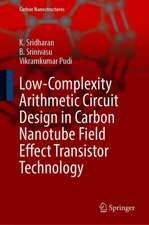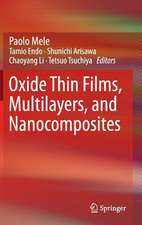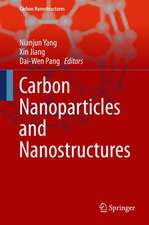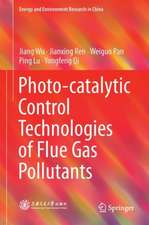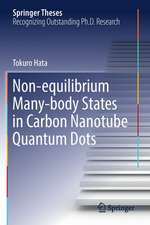Nanoscale Sensors: Lecture Notes in Nanoscale Science and Technology, cartea 19
Editat de Shibin Li, Jiang Wu, Zhiming M. Wang, Yadong Jiangen Limba Engleză Hardback – 21 ian 2014
| Toate formatele și edițiile | Preț | Express |
|---|---|---|
| Paperback (1) | 560.61 lei 38-44 zile | |
| Springer International Publishing – 17 sep 2016 | 560.61 lei 38-44 zile | |
| Hardback (1) | 632.06 lei 6-8 săpt. | |
| Springer International Publishing – 21 ian 2014 | 632.06 lei 6-8 săpt. |
Din seria Lecture Notes in Nanoscale Science and Technology
- 24%
 Preț: 804.96 lei
Preț: 804.96 lei - 18%
 Preț: 943.15 lei
Preț: 943.15 lei - 18%
 Preț: 977.64 lei
Preț: 977.64 lei - 24%
 Preț: 714.82 lei
Preț: 714.82 lei - 18%
 Preț: 929.36 lei
Preț: 929.36 lei - 15%
 Preț: 623.34 lei
Preț: 623.34 lei - 15%
 Preț: 618.08 lei
Preț: 618.08 lei - 15%
 Preț: 621.27 lei
Preț: 621.27 lei - 18%
 Preț: 925.53 lei
Preț: 925.53 lei - 18%
 Preț: 933.21 lei
Preț: 933.21 lei - 15%
 Preț: 636.02 lei
Preț: 636.02 lei - 18%
 Preț: 932.43 lei
Preț: 932.43 lei - 15%
 Preț: 629.67 lei
Preț: 629.67 lei - 18%
 Preț: 922.30 lei
Preț: 922.30 lei - 18%
 Preț: 974.58 lei
Preț: 974.58 lei - 18%
 Preț: 927.66 lei
Preț: 927.66 lei - 15%
 Preț: 623.79 lei
Preț: 623.79 lei - 15%
 Preț: 634.13 lei
Preț: 634.13 lei - 18%
 Preț: 972.14 lei
Preț: 972.14 lei - 15%
 Preț: 678.79 lei
Preț: 678.79 lei - 18%
 Preț: 973.82 lei
Preț: 973.82 lei - 15%
 Preț: 630.48 lei
Preț: 630.48 lei - 18%
 Preț: 1077.31 lei
Preț: 1077.31 lei - 18%
 Preț: 867.29 lei
Preț: 867.29 lei - 18%
 Preț: 980.12 lei
Preț: 980.12 lei - 18%
 Preț: 1088.19 lei
Preț: 1088.19 lei - 15%
 Preț: 623.34 lei
Preț: 623.34 lei - 18%
 Preț: 926.58 lei
Preț: 926.58 lei
Preț: 632.06 lei
Preț vechi: 743.60 lei
-15% Nou
Puncte Express: 948
Preț estimativ în valută:
120.98€ • 126.09$ • 100.71£
120.98€ • 126.09$ • 100.71£
Carte tipărită la comandă
Livrare economică 04-18 ianuarie 25
Preluare comenzi: 021 569.72.76
Specificații
ISBN-13: 9783319027715
ISBN-10: 3319027719
Pagini: 296
Ilustrații: XII, 281 p. 165 illus., 95 illus. in color.
Dimensiuni: 155 x 235 x 20 mm
Greutate: 0.7 kg
Ediția:2013
Editura: Springer International Publishing
Colecția Springer
Seria Lecture Notes in Nanoscale Science and Technology
Locul publicării:Cham, Switzerland
ISBN-10: 3319027719
Pagini: 296
Ilustrații: XII, 281 p. 165 illus., 95 illus. in color.
Dimensiuni: 155 x 235 x 20 mm
Greutate: 0.7 kg
Ediția:2013
Editura: Springer International Publishing
Colecția Springer
Seria Lecture Notes in Nanoscale Science and Technology
Locul publicării:Cham, Switzerland
Public țintă
ResearchCuprins
Preface.- Chapter 1: Recent progress in the development of novel nanostructured biosensors for detection of water borne contaminants.- Chapter 2: Nanosensors for intracellular Raman studies.- Chapter 3: BioFET-SIM: a Tool for the Analysis and Prediction of Signal Changes in Nanowire Based Field Effect Transistor Biosensors.- Chapter 4: Semiconductor-Based Nanostructures for Photoelectrochemical Sensors and Biosensors.- Chapter 5: ZnO hydrogen nanoscale sensors.- Chapter 6: Recent advances in the design of photodetectors based on thin film and nanostructured ZnO.- Chapter 7: Thin Film Gas Sensors Based on Nanocarbon Materials.- Chapter 8: A Do-it-Yourself (DIY) Guide to using carbon nanotubes for stretchable electronics and sensors.- Chapter 9: Ultra-Sensitive In-Plane Resonant Nano-Electro-Mechanical Sensors.- Index.
Textul de pe ultima copertă
This book is a comprehensive introduction to nanoscale materials for sensor applications, with a focus on connecting the fundamental laws of physics and the chemistry of materials with device design. Nanoscale sensors can be used for a wide variety of applications, including the detection of gases, optical signals, and mechanical strain, and can meet the need to detect and quantify the presence of gaseous pollutants or other dangerous substances in the environment. Gas sensors have found various applications in our daily lives and in industry. Semiconductive oxides, including SnO2, ZnO, Fe2O3, and In2O3, are promising candidates for gas sensor applications. Carbon nanomaterials are becoming increasingly available as “off-the-shelf” components, and this makes nanotechnology more exciting and approachable than ever before. Nano-wire based field- effect transistor biosensors have also received much attention in recent years as a way to achieve ultra-sensitive and label-free sensing of molecules of biological interest. A diverse array of semiconductor-based nanostructures have been synthesized for use as a photoelectrochemical sensor or biosensor in the detection of low concentrations of analytes. A novel acoustic sensor for structural health monitoring (SHM) that utilizes lead zirconate titanate (PZT) nano- active fiber composites (NAFCs) is described as well.
- Surveys novel technologies for nanoscale sensors
- Provides the keys to understanding the principles underlying nanoscale sensors
- Written by leading experts in the corresponding research areas
- Describes enabling technologies for critical health, environmental science, and security applications
Caracteristici
Surveys novel technologies for nanoscale sensors Provides the keys to understanding the principles underlying nanoscale sensors Written by leading experts in the corresponding research areas Describes enabling technologies for critical health, environmental science, and security applications Includes supplementary material: sn.pub/extras
